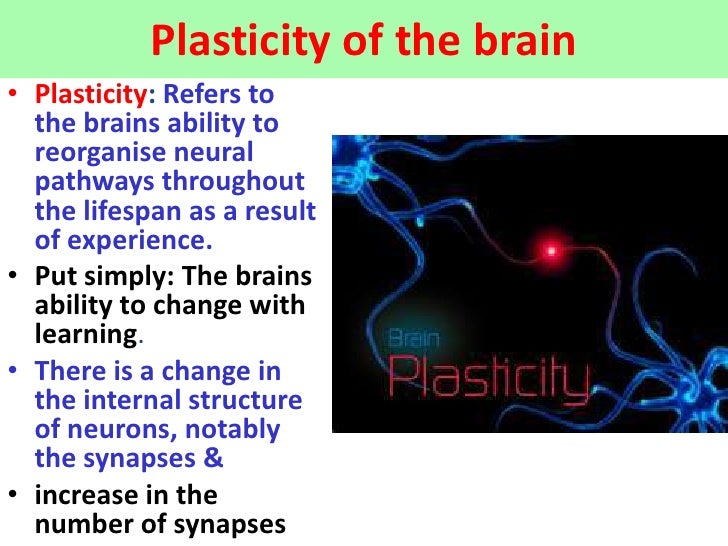Do More Intelligent Brains Retain Heightened Plasticity for Longer in Development? A Computational Investigation.
Michael S.C. Thomas | Published June 2016
• The heritability of general cognitive ability increases with age; this occurs later for high ability individuals.
• General cognitive ability is associated with differential rates of change of brain structure.
• We use computational modeling of population development to link genes, brain and behavior.
• We provide the first unified mechanistic account of these data.
• Data are explained by the increasing non-linear behavior of neurocomputational systems across development causing divergence between non-identical twins.
 |
| Source: https://www.youtube.com/watch?v=Dm5h1Z88lWQ |
 |
| Source: http://www.slideshare.net/Psyccounting/plasticity-of-the-brain-13427564 |
<more at http://www.sciencedirect.com/science/article/pii/S1878929315301043; related articles and links: http://fhlfound.securesites.net/wordpress/2015/01/13/of-marshmallows-brain-plasticity-and-attachment-part-i/ (Of Marshmallows, Brain Plasticity and Attachment (part I). January 13, 2015. The remaining two parts of this series are: http://fhlfound.securesites.net/wordpress/2015/01/20/of-marshmallows-brain-plasticity-and-attachment-part-ii/ (Of Marshmallows, Brain Plasticity and Attachment (part II). January 20, 2015) and http://fhlfound.securesites.net/wordpress/2015/01/27/of-marshmallows-brain-plasticity-and-attachment-part-iii/ (Of Marshmallows, Brain Plasticity and Attachment (part III). January 27, 2015) and http://www.jneurosci.org/content/30/16/5519.full (Brain Plasticity and Intellectual Ability Are Influenced by Shared Genes. Rachel G. H. Brans, René S. Kahn, Hugo G. Schnack, G. Caroline M. van Baal, Danielle Posthuma, Neeltje E. M. van Haren, Claude Lepage, Jason P. Lerch, D. Louis Collins, Alan C. Evans, Dorret I. Boomsma, and Hilleke E. Hulshoff Pol. The Journal of Neuroscience, 21 April 2010, 30(16): 5519-5524; doi: 10.1523/JNEUROSCI.5841-09.2010. [Abstract: Although the adult brain is considered to be fully developed and stable until senescence when its size steadily decreases, such stability seems at odds with continued human (intellectual) development throughout life. Moreover, although variation in human brain size is highly heritable, we do not know the extent to which genes contribute to individual differences in brain plasticity. In this longitudinal magnetic resonance imaging study in twins, we report considerable thinning of the frontal cortex and thickening of the medial temporal cortex with increasing age and find this change to be heritable and partly related to cognitive ability. Specifically, adults with higher intelligence show attenuated cortical thinning and more pronounced cortical thickening over time than do subjects with average or below average IQ. Genes influencing variability in both intelligence and brain plasticity partly drive these associations. Thus, not only does the brain continue to change well into adulthood, these changes are functionally relevant because they are related to intelligence.])>

No comments:
Post a Comment